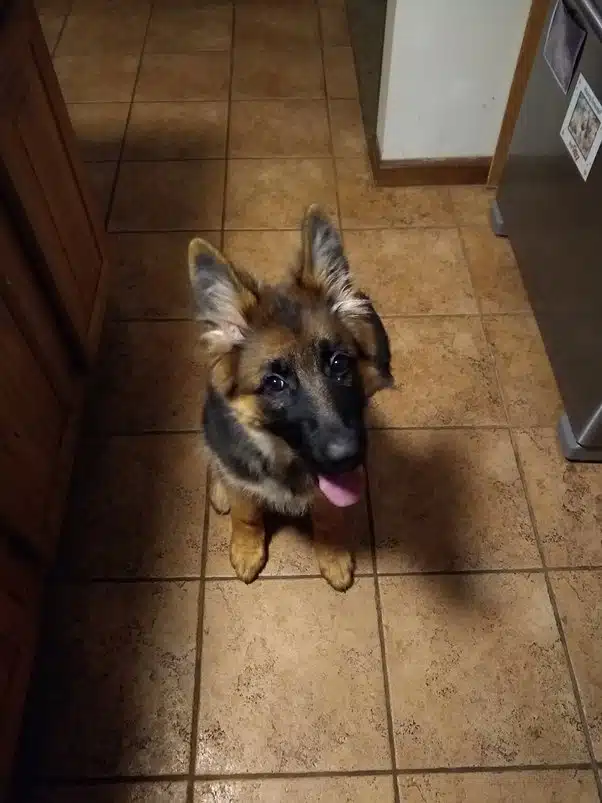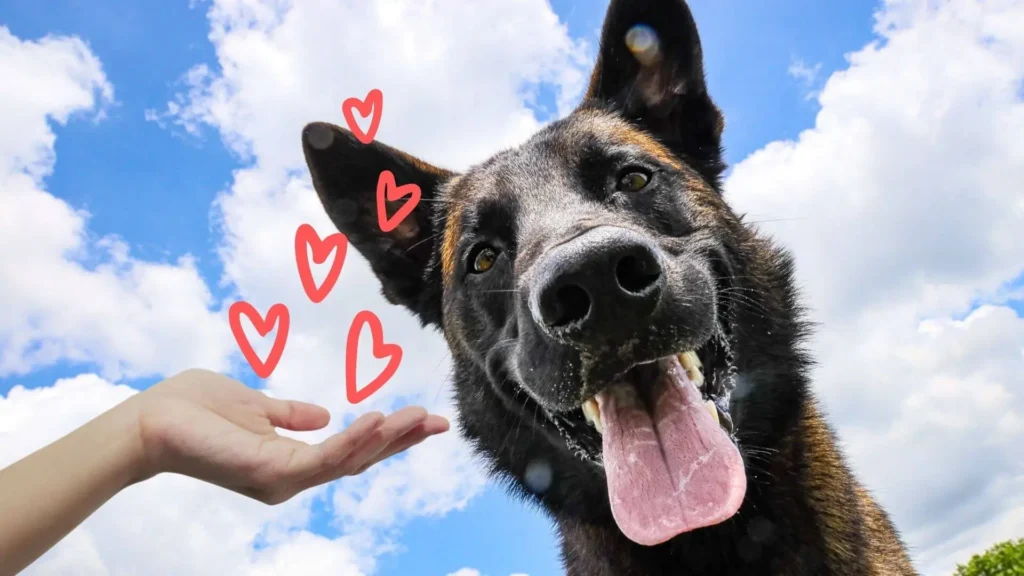Assume you know how to discipline a German Shepherd puppy in the right way so that your bond with your dog grows instead of diminishing!
Table of Contents
Learn how to communicate with your puppy and get the behaviors you want using these simple and easy methods to train a German Shepherd puppy.
Learn how to discipline a German Shepherd puppy the perfect way
You may think that your German Shepherd puppy behavior is intentional at 8 to 12 weeks or that they are bad.
In fact, the 12-week-old German Shepherd still does not have the maturity to fully understand their bad behavior.
Even if you can divert their attention to desired behaviors or their undesirable actions, it is best not to discipline the puppy harshly when they are in their teens.
Depending on how severe your discipline is, they may fear you or fear for your existence. Anxiety also increases with greater punishment or useless corrections.
Is a German Shepherd puppy being trained at 12 weeks of age? Yes, you can!
A GSD puppy 12 weeks or older still needs positive reinforcement for optimal behavioral changes.
Your GSD should not be disciplined by hitting, kicking, slapping, threatening or shouting. When the German Shepherd puppy first arrives you can start training them.
Do you want your partner to correct their German Shepherd puppy misbehavior and become the sweet angel you want them to be?
When overcoming bad behavior, follow these simple disciplinary tips that will keep your relationship with your dog strong.
You can easily learn how to train a German Shepherd puppy using these little puppy training tips.
1. Start Training from Day 1 While Welcoming Your German Shepherd Puppy

When it comes to training and disciplining a German Shepherd puppy, the key is to start as early as possible. These intelligent and energetic dogs thrive on structure, consistency, and positive reinforcement from a young age.
As soon as you bring your new German Shepherd puppy home, you should begin establishing clear rules, boundaries, and a routine. This will help your pup feel secure and learn what behaviors are acceptable in your household.Here are some tips for starting training from day one:
Set Clear Expectations
Sit down with your family and decide on the rules you want your puppy to follow, such as where they are allowed to go, what they can chew on, and how you want them to behave during interactions. Make sure everyone in the household is on the same page and consistently enforces these expectations.
Use Positive Reinforcement
German Shepherd puppies respond best to reward-based training methods. When your pup displays the behaviors you want, be sure to praise them and offer treats or playtime as a reward. This will reinforce the good conduct and encourage them to repeat it.Avoid punishing your puppy, as this can damage your bond and lead to fear or aggression. Instead, redirect unwanted behaviors by interrupting them and guiding your pup towards an acceptable alternative.
Establish a Routine
Puppies thrive on predictability, so create a daily schedule for feeding, potty breaks, naps, training sessions, and playtime. Sticking to this routine will help your German Shepherd puppy feel secure and learn what is expected of them.
Start Basic Obedience Training
Even young puppies can begin learning simple commands like “sit,” “stay,” and “come.” Incorporate these into your daily interactions, using positive reinforcement to teach your pup. This lays the foundation for more advanced training down the line.
Be Patient and Consistent
Training a German Shepherd puppy takes time, effort, and consistency. Stick with it, even when progress seems slow. Celebrate small victories, and remember that with patience and the right approach, your pup will learn.By starting training and discipline from the moment you bring your German Shepherd puppy home, you’ll be setting them up for success and building a strong, trusting bond that will last a lifetime.
2. Use reward-based training.

Reward-based training can help your puppy identify when something is a bad choice. When your puppy performs what you ask, give him a delicious treat and words of praise. Your puppy will know that good treats will come to them when they do something we like.
For example, have your puppy sit and be ready to walk when you are near the front door. Get them to execute this command before you open the door and do not allow them to start the habit of running in front of you.
It teaches them that when they behave, they have a chance to get what they want.
So what is really the best way to train a German Shepherd puppy?
When it comes to training and disciplining a German Shepherd puppy, reward-based methods are widely considered the most effective approach. These intelligent and energetic dogs thrive on positive reinforcement and respond much better to rewards than punishment.Here’s a closer look at why reward-based training is so beneficial for German Shepherd puppies:
Builds a Positive Bond
Reward-based training helps build a strong, trusting bond between you and your puppy. By using treats, praise, and playtime as positive reinforcement, you’re showing your pup that good behavior leads to good things. This encourages them to want to please you, rather than fear you.
Encourages Good Behavior
German Shepherd puppies are highly motivated by rewards. When you reward them for doing something right, they’ll be much more likely to repeat that behavior in the future. This positive reinforcement is a powerful tool for shaping your puppy’s conduct.
Avoids Negative Consequences
Punishing your German Shepherd puppy, whether through physical discipline or harsh verbal corrections, can damage your relationship and lead to fear, anxiety, and even aggression. Reward-based training avoids these negative outcomes and keeps training a positive experience.
Boosts Confidence
Reward-based training helps build your puppy’s confidence as they learn new skills and behaviors. The sense of accomplishment they feel when they’re praised and rewarded for doing something right is incredibly motivating and encourages them to keep trying.
Translates to Real-World Situations
The skills your German Shepherd puppy learns through reward-based training will serve them well in real-world situations. They’ll be more responsive to your commands and better able to make good choices, even when faced with distractions or temptations.To implement reward-based training effectively:
- Use high-value treats, like small pieces of cooked chicken or cheese, to reward good behavior
- Praise your puppy enthusiastically when they do something right
- Incorporate play and affection as rewards, in addition to food
- Be consistent in your training approach across all family members
- Gradually phase out food rewards as your puppy masters new commands
By making training a positive, rewarding experience for your German Shepherd puppy, you’ll set them up for success and build a lifelong bond in the process.
3. Divert bad German Shepherd puppy behavior.

When it comes to disciplining a German Shepherd puppy, one of the most effective strategies is to divert their attention away from undesirable behaviors. These intelligent and energetic dogs can quickly develop bad habits if left unchecked, so it’s important to intervene early and redirect them towards more positive actions.Here are some tips for diverting bad behavior in your German Shepherd puppy:
Identify Triggers
Start by observing your puppy’s behavior and identifying the situations or triggers that lead to unwanted actions. This could be anything from excessive barking to chewing on furniture. Understanding the root cause will help you better address the issue.
Interrupt and Redirect
When you notice your puppy engaging in a bad behavior, immediately interrupt them with a firm “no” or “stop.” Then, quickly redirect their attention to a more appropriate activity, such as a chew toy or a training command. Praise and reward them when they comply.
Also Read: Best Treats for German Shepherd Puppies that are Healthy and Nutritious
Provide Appropriate Outlets
German Shepherds have high energy levels and strong jaws, so they need plenty of physical and mental stimulation to prevent boredom and destructive behaviors. Make sure to provide your puppy with plenty of exercise, interactive toys, and training sessions throughout the day.
Manage the Environment
Limit your puppy’s access to areas of the home where they may be tempted to chew or dig. Use baby gates, crate training, and designated “puppy-proof” zones to keep them out of trouble when you can’t directly supervise them.
Be Consistent
Consistency is key when it comes to disciplining a German Shepherd puppy. All family members should use the same commands, rewards, and consequences to ensure your puppy understands what is expected of them.By proactively diverting your puppy’s attention away from bad behaviors and providing them with appropriate outlets, you can effectively shape their conduct and set them up for success. Remember to be patient, persistent, and positive throughout the training process
4. Ignore the unnecessary barking.

One of the most effective ways to discipline a German Shepherd puppy’s barking behavior is to simply ignore it. These intelligent dogs often use barking as a way to seek attention or get what they want, so responding to it can inadvertently reinforce the behavior.Here’s how to properly ignore your German Shepherd puppy’s unnecessary barking:
Avoid Eye Contact and Verbal Responses
When your puppy starts barking, resist the urge to yell at them, make eye contact, or give any kind of verbal response. This can be interpreted as a reward, even if you’re scolding them.
Don’t Give In to Demands
If your puppy is barking to get your attention, a toy, or access to something they want, do not give in. Remain calm and wait for them to stop before rewarding with praise or the desired item.
Redirect to a Positive Behavior
As soon as your puppy stops barking, immediately redirect them to a more desirable behavior, such as a training command or toy. Reward this with treats, affection, or playtime.
Be Consistent
It’s important that all family members consistently ignore the barking. If one person gives in, it can undermine the training and confuse your puppy.
Consider the Cause
If your German Shepherd puppy is barking excessively, try to identify the underlying cause. Is it boredom, fear, or excitement? Addressing the root issue can help curb the barking behavior.
If the behavior persists, place your dog in another room for two minutes and repeat the expiration procedure each time they bark at the joggers (remember to use a pet-safe baby gate and do not close the back door of a puppy because it will cause them concern).
Even better, get a friend to help and they walk past your window and work to redirect your dog to the toy or treatment you have. It teaches how to focus on other gift-giving items (toys and treats) and bounces on people running in the past.
5. Avoid physical punishment and abuse.

Research shows that physically punishing your dog (e.g. hitting, kicking, yelling or staring at them) can increase aggression in your dog.
When it comes to disciplining a German Shepherd puppy, it is crucial to avoid physical punishment and abuse. These methods are not only ineffective but also harmful and can lead to long-term damage to your puppy’s mental and emotional well-being.Here are some reasons why physical punishment and abuse should be avoided:
Physical Punishment Can Increase Aggression
Physical punishment can increase aggression in German Shepherd puppies, making them more likely to bite and become defensive. This can lead to a vicious cycle of punishment and aggression, causing harm to both the puppy and the person trying to discipline them.
Physical Punishment Can Damage Trust
Physical punishment can damage the trust between you and your puppy, leading to fear and anxiety. This can make it difficult to establish a strong bond and can lead to behavioral problems in the future.
Physical Punishment Can Cause Physical Harm
Physical punishment can cause physical harm to your puppy, especially if it is done excessively or with force. This can lead to injuries, such as cuts, bruises, and even broken bones.
Positive Reinforcement is a Better Approach
Instead of physical punishment, positive reinforcement training methods are recommended. These methods focus on rewarding good behavior and ignoring bad behavior, rather than punishing it. This approach is more effective and humane, and it can help to build a strong and loving bond between you and your puppy.
Consistency is Key
Consistency is key when it comes to disciplining a German Shepherd puppy. It is important to establish clear rules and boundaries and to consistently enforce them. This can help to prevent behavioral problems and can make it easier to discipline your puppy when they misbehave.
Don’t give up!
Use positive training and catch when your dog is good and reward those behaviors. Ignore actions you don’t like and they will start to fade.
The truth of the matter is, if you are reading this you are a loving owner who wants to know more about living with their German Shepherd.
Have you seen how thousands of other thinkers read my review of the Brain Training Program for Dogs that you can use from the comfort of your home to promote good behaviors?
Is it useful? Share it!

